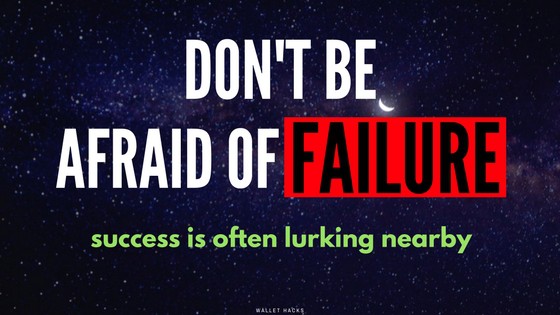I haven’t updated my resume in over a decade. Today, that’s going to change.
But it’s not going to change in the way you think – I’m going to create a failure resume.
A failure resume is exactly what it says – it’s when you list your career and personal failures. It’s not a new idea (I got it from Pete at Do You Even Blog’s and his failure resume) and it’s one that has tremendous value for both the creator and the reader.
Until this moment, I’ve never written these down. They’ve been my fuel and in my head.
This is also not a list of every failure. There are far more. These are just the ones that were important and, as a result, the ones that I even remember. These are the failures ones that helped shape who I am today and I’ll explain why I, as an arm-chair psychologist, think they did.
My failure resume is extensive. Here it is. Enjoy. 🙂
Table of Contents
- Fire for the 1st Time
- Westinghouse Science Talent Search
- Jim Tau Jim
- One Job Offer
- Never Been Promoted
- “How Much Money Is Your Little Blog Making?”
- Many Blogging/Website Failures
- Business Failure: Microblogger
- Business Failure: White Pixel
- Real Estate Investing in the Midwest
- Angel Investing in a Dud
- Kasai Media
- My Next Failure is…
Fire for the 1st Time

In high school, I worked at a fast food Chinese food place for 8 hours a week – four on Friday, four on Saturday. They gave me $20 a day, under the table, right out of the till.
It was set up because I asked my parents how I could get a job. We were in a restaurant where they had a friendly casual relationship with the owner and so they asked – “Hey, are you hiring?” They weren’t hiring at that place but they needed a kid to answer the phones at their takeout joint.
For a couple years, I worked at one of those Chinese fast food take-out joints you see in practically every strip mall in America. (in two years, not a single person has ever eaten in the restaurant… I don’t even know why they have tables set up).
Eventually, I was moved to another restaurant – a Chinese buffet. There, I worked the front desk with a girl who lived nearby named Becky. That went on for a few years until business started to slow so they wanted to move me back to Chinese takeout place.
Not going to lie, Becky was cute and I enjoyed chatting with her so I said no. Plus the other place was 15 minutes farther away and you left the place smelling like oil. And I couldn’t wear contacts because the oil bothered my eyes. But the biggest reason was Becky.
So they let me stay on a few more months until it became obvious they didn’t need two people up front… so they told me it was time to go.
What’s funny is that I saw the firing a mile away – I think when someone gets fired, they usually know.
(oddly enough, that’s the only time I was ever fired)
Westinghouse Science Talent Search

In high school, Ward Melville High School, we had a special club/class called West Prep led by Mrs. Krieger. Basically, it was a club of all the smart high achievers in the high school. I don’t remember if you had to apply or had to be invited, but I wasn’t. Most of my classmates were in it and in my junior year, I was invited (I believe my friend Gaurav suggested it if my memory serves correctly).
The purpose of the club was to get you ready to submit a paper for the Westinghouse Science Talent Search. This was a well-researched paper you did with a college professor as an advisor. To give you a sense of how good this program was, and how awesome Mrs. Krieger was, there were 4 Finalists my year. There were 15 in all of New York. Maryland and California were 2nd with only 4.
I felt honored to be invited but I never felt like I belonged. In our school district, they identified high performing kids in 3rd grade and they all spent 4th-6th grade together. 7-9th was our middle school when the district broke up again into two junior high schools. By 10th grade, these kids were all good friends. I was just a kid from their class when I joined in 11th grade.
I also wasn’t a superstar, by any stretch. My grades put me somewhere in the low 30s of my class and this program was made up of the remaining 29+ people who did better than me at school. Everyone was cool, I have fond memories but never felt like a part of the club. It was eye-opening for me.
That year, I did a paper for the Westinghouse and received a polite letter than I wasn’t a Semi-finalist.
Jim Tau Jim

While at college, I join a fraternity, Delta Tau Delta.
I don’t remember the exact particulars but I do remember initiating, become a brother, and then I think I sent out an email with suggestions or ideas on how to do a few things differently. I remember that the response was friendly ridicule (i.e. “we should rename the fraternity Jim Tau Jim!”) and an older brother bringing me aside and saying something to the effect of “You don’t just change things. And if you do, it’s not with an email.”
Which is 100% true. Whether the organization is a huge thousand person company or a loose social connection of fifty college guys, change doesn’t happen that way. It’s incremental. It’s like changing habits, you don’t just pick a New Year’s Resolution and it sticks. You adjust with small changes that, when repeated over and over again, become a habit.
You have to create an insurgency.
One Job Offer
I started college in 1998 and I graduated one semester early in 2001 with a degree in Economics and Computer Science. I had saved myself and my parents a semester of college, the ultimate in college frugality. I was rewarded with an awful job market.
For those who didn’t know what the world was like in December 2001, it was abysmal for everyone but especially computer science majors.
The dot-com bubble had burst in March of 2001. My friends who had graduated had offers rescinded in the summer. Then 9/11 and here I was in December looking for a job. No one was hiring.
By no one, I mean no one. If you thought the summer of 2001 was bad for jobs, the winter was even worse because no one was even thinking about it then.
So I went straight to graduate school, the MSIT – Software Engineering program at CMU, by taking the Spring semester courses. Then I applied to the program, hoped I got in (I did, this isn’t a story about that!), and then I took the Fall courses. Looking back, that was ballsy as hell and I’m glad it worked out!
I learned a big lesson about rules, organizations, and people. My degree says graduation December 2001 but I took the Masters classes as a second-semester senior, paying an undergrad tuition for a Masters semester. They let me take the courses because I was already a student (I took the GRE but it was unnecessary). They let me into the program because of the relationships I forged with my professors, knowing full well the committee to select who gets in was made up of the professors themselves.
Relationships matter above all else. Rules and organizations are created by people, they aren’t the immutable laws of physics. Rules exist to the extent they are enforced and act as cover for the people enforcing them. I got in, graduated, and while it felt very much like I got in through the back door and left out the back… my degree was the same as everyone else’s.
It was only a one-year program but it was enough breathing room for non-tech companies to start considering hiring. That Spring job fair was half the size it normally was and half of the companies there were there to show support and “maintain a relationship” with the school. They weren’t hiring.
I had six interviews, two on-site interviews, and one job offer. I took it and was thankful.
Never Been Promoted
I worked in defense from 2003 to 2008 – three years with Northrop Grumman and 1.5 years with Booz Allen Hamilton – and I’ve never been promoted. I’ve also never gotten more than a 4% raise except when I left NGC to BAH, where I negotiated a 36% raise.
As an advocate for my corporate career, I’m a failure.
I’d grown up in an academic system where I was told what to do. These are the classes, take them, do well on the exams to move on up, keep doing this until the year ends and you graduate. The list is straightforward, you do it, you get the paper. Next level, please.
In the corporate world, it’s different. The work is still the work. You need to “get good grades” but your relationship with your managers, your manager’s manager, the client, etc. – they matter too. Sometimes, they matter more.
In a world where the score is hard to calculate, it comes down to relationships and how you feel about someone. If there aren’t grades to review, who is a better student? The one who is friendlier, more engaging, and present or the person who might know more but doesn’t have a sunny disposition, doesn’t ask about your day, and doesn’t go to the stupid happy hours because they’d rather be doing something else with their time?
“How Much Money Is Your Little Blog Making?”
Bargaineering was a small nothingburger before it became a big somethingburger. In the beginning, I told everyone I had this blog. I started it because I was trying to understand my finances, especially my employer retirement and health plans, and my friends worked at the same company. So I told them I’d written a post about it, blah blah, and they didn’t care.
It was my hobby so it’d come up in casual conversation, how it was set up, how it made cents per click on Adsense (it should really be called Adcents because that’s how much you make), and I guess some were tired of hearing about it. 🙂
One of those days, one of my friends, in a good natured way, asked me how much the little blog was making this month. It didn’t bother me at the time but it was like a little nick that would become a much bigger wound. It got me a little fired up, but in a good way. It became fuel for me to push even harder and “show him” that it could be a real thing.
It also taught me one very important lesson – no one cares about your projects as much as you do.
This is true whether they’re employees you pay or your friends & family who say they will support you. They’re not being mean or uncaring, it’s that they have their own things to worry about. If you want to grow a business, you have to do it with strangers… friends and family who support you should be the icing on the cake. (this is why I hate MLM programs and all those companies that rely on “parties” to sell the product)
Here lies the Bargaineering Line:
Everything above this green box happened before Bargaineering’s success, which was a massive personal and financial win. Since many of these things span wide ranges, this line acts as a way to know where everything fits around the tentpole success that was my first personal finance blog. It puts everything else into a little bit of context.
Many Blogging/Website Failures
Like many other bloggers, I registered a lot of domains with future plans to build them into something big. I’d even purchased one domain on the secondary market ($300 for SECFraud dot com).
I viewed them as buying seeds. I’d plant them and see if any took root.
Very few did. I won’t list all of their names here, other than the one above that I paid more than registration fees, but I will share with you one key idea I learned – seeds don’t grow into plans without care and attention (and nutrients).
I wasn’t giving any of these websites enough care and attention to get them to flourish. I thought I’d publish a few posts every so often, maybe do some light marketing, and then the ones that became popular could become something.
I was doing the equivalent of adding a few drops of water each week and thinking that was enough.
If you want something to succeed, you have to give it so much care and attention you’re afraid you might be drowning it. Some of your efforts might be wasted because the business isn’t ready for it yet but that’s fine, you’re supposed to be giving it all you can. If it works, great. If it doesn’t, it’s not for lack of effort.
Business Failure: Microblogger

After Bargaineering, I thought it’d be fun to work on a blog about blogging!
I called it Microblogger, a domain I had since 2005 when I started Bargaineering.
I’d seen the massive success that Pat Flynn was having with Smart Passive Income so I wanted to emulate it and share my take on blogging. I did a podcast, which published 36 episodes, and had a lot of fun learning a lot of the blogging tactics I’d missed.
I stuck with it about a year before giving up on it, having made a few hosting commissions but nothing financially significant, because I realized I didn’t like blogging about blogging. It’s the same reason why I would make a terrible food blogger (besides not knowing how to take good food photos).
I enjoy the work. I enjoyed the research. I didn’t enjoy documenting. I didn’t want to stop to write about it because it wasn’t doing anything for me.
People say that pursuing your passion is bullshit (and it is as a precondition). That might be true for your day job, but if it’s a side project that has a long lead time until you’ll fine financial success, you better at least enjoy it.
Business Failure: White Pixel
White Pixel was a business me and a few friends cooked up while sitting on the patio of L’Auberge in Del Mar, California. I’d go on to do a few things with these friends, all of which ended in various shades of positive, but this one was a failure with no significant financial penalty (the best kind of failure!).
Have you ever gone to Home Depot to look at something and then discover ads following you around other sites in advertising? That’s retargeting. Home Depot knows you’re interested in that shovel so they show you ads with that shovel. The hope is that you’ll click through and buy that shovel.
Our idea was similar in that we thought we could retarget folks who visited certain types of sites with advertising for similar services. So if you visit Wallet Hacks, presumably you are interested in money and personal finance. So we would advertise credit cards, banks, etc. We pay a site to host the pixel, then we charge a client to use that pixel to show retargeting ads.
We had a couple clients, one of which was a large company you’d be familiar with, and the challenge was having them buy into the idea of retargeting. This was almost 10 years ago. Today, it’s an easy sell but now people just go to Facebook for that data (which many people are now learning!).
Real Estate Investing in the Midwest

I wanted to diversify into real estate. I couldn’t do it in the Washington D.C. area because it’s too freaking expensive. And this was years before companies like Fundrise and other RE crowdfunding sites appeared.
The plan was to work with a few folks I trusted in the midwest, specifically Kansas City, MO; to buy single-family homes in industrial areas. These were relatively small, 2 bedroom 1.5 bath, homes that we could buy outright, improve, and rent out. Eventually, we’d bundle a few of these together to get a loan and repeat.
One of us lived in that area and could act as the property manager and scout. The other two would not be local and provide the liquidity needed to do these deals.
Things went well for a little while but little things bubbled up to make the whole deal more hassle than it was worth. The real challenge was finding appealing properties as the areas improved. We were not able to find good units to invest in. Our local person wasn’t doing this full-time and I think he got distracted with other projects.
We decided to shut it down. The grand plan to make it huge wasn’t going to happen so having a minor concern didn’t seem like it was worth the effort. Better to fail fast than wander along like a zombie, right?
I do think that real estate is a good investment area to get into but I’m leaning towards crowdfunding real estate investing rather than direct investments. The two I’m most interested in are stREITwise (read my full review of stREITwise) and Fundrise (read my Fundrise review).
Angel Investing in a Dud
I’ve done a few angel investments and there were a few wins, a few minor losses, and one complete loss.
The complete loss was the most interesting one because it mirrors a lot of failures in life – one of communication.
The basic gist is that I, along with others, invested in a company that would change the way folks edited their WordPress blogs. The technology was pretty good, they had partnerships on the horizon, and you can see their competitors flourishing in the marketplace today.
This failure changed my thinking on angel investing. I can’t say why the business itself failed but the communication of that failure was what bothered me. The founder, who seemed technically adept, was open and eacy to reach before getting money then became harder to reach. There were infrequent updates and when there was, it was always of the “hey we need money” or “can you send business our way?” types of requests.
Eventually, he stopped responding entirely and even today, I have yet to get a final K-1 so I can even claim the loss on my taxes!
When VCs say you invest in people, they’re 100% correct.
Kasai Media
I expanded on it more in this post about what we learned shutting down Kasai Media, including why it failed, but the main reason is that it ceased being an interesting business to be involved in.
My Next Failure is…
… To Be Determined. 🙂

Now it’s your turn – how have your failures shaped you?




White Pixel is a great name.
Also, the bit about creating insurgency really got me. I like that word.
Well done Jim 😉
That’s an amazing article! Thank you! And helps me feel less stupid about my own mistakes…My past failures are of two categories- either I was in love or I was impatient (or both). I bought my first condo in Prague in the same building as my bf’s parents in my early 20s. I broke up with him, moved to Canada, did not want to deal with renting the condo (and seeing occasionally father of my ex at strata meeting who stopped even saying hello to me). I sold couple years back for a small profit. End of 2017, the price… Read more »
Get after it! Don’t let the setbacks keep you down!
Any chance you could buy bargaineering back? it was awesome, like having a talk with the smartest guys in the office. Then it became a mommy site. Steve Jobs went back to Apple, you can do a repeat act Jim!
Bargaineering was great, I had a lot of fun and did a lot of work on it, but I closed that chapter when I said good-bye. It’s a mental thing too – when I say bye, it’s bye for real. I have a new project to work on now. 🙂
I love a bit of failure myself – if things all work out, I reckon I’m not pushing myself enough.
Anyway, I don’t think you were even sacked Jim, you were made redundant!
And the Angel investing is interesting, and sort of confirms my theory that’s it’s for the mega rich only.
Hey Jim! Your story about Becky made me laugh haha! I know your main point was about getting “fired” but Becky just made it entertaining. 🙂 Along with your other stories, I was very fascinated by your blogging journey! I read about Bargaineering and was really impressed by how you built a successful project from scratch and sold it. Kudos to you, man! When you mentioned about how your friends weren’t interested in your blogging journey back in the day, I could relate to that today. I don’t think my few friends care about what I write on my blog… Read more »
I absolutely love when people post about their failures in life. When trying to get a true insight on how successful people became successful, it’s their failures that tell the story. Not their successes. Growing up in sports, I learned quickly that you learn more from losing than you do from winning. I actually found that those who succeeded the most in my high school (sports, popularity, etc.) have struggled the most in adult life. When you constantly “win” or are told you are winning all the time at a young age, it fails to prepare you for the real… Read more »
This was such a good article! I’m also writing about my failures because it’s important to remember where I’ve come from, to remember that failures didn’t kill me and not to be afraid of or ashamed of failure in the future.
Jim, I need to print out this quote: “If you want to grow a business, you have to do it with strangers… friends and family who support you should be the icing on the cake.” People are always saying, market your blog to your friends/family! They should be the ones you pitch first! Why?? My friends and family, as much as they love me, don’t care at all about what I blog about. They support me in that they don’t tease me about it, but they couldn’t care less about my blog. Strangers are what grow my business! Friends/family are… Read more »
I think the reason they say that is so you can collect as many easy wins as possible. Friends and family are more likely than strangers to buy whatever you’re selling because of an existing affinity… they like you, maybe they do it to be charitable, who knows. Whatever the reason, it’s not something you can rely on. Your business MUST rely on strangers. That’s why MLM things are such bullshit. Oh invite me to your party, you don’t have to buy anything (yeah ok), just come hang out… etc. A business that can only survive if you sell to… Read more »
Love the honesty, Jim.
I’ve listened to a number of those Microblogger podcasts, and I thought they were great! I wouldn’t consider it a total failure; I didn’t even realize that’s now over and done with.
Cheers!
-PoF
Fun Read… I think my failure resume wouldn’t need a separate post from “my life”… haha